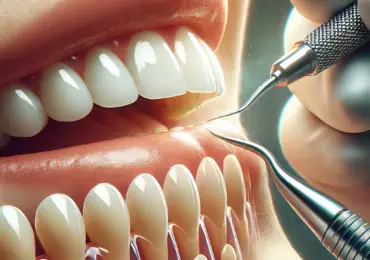Veneers are a popular solution for achieving a flawless smile, perfect for addressing chipped, discolored, or uneven teeth. This guide covers the benefits, types, process, and costs to help you make an informed decision about your smile makeover.

What Are Veneers?
Dental veneers are thin, custom-made shells crafted to cover the front surface of your teeth. Think of them as protective yet aesthetic covers, designed to improve the appearance of your teeth while providing added durability. Typically created from porcelain or composite resin materials, veneers are bonded permanently to the teeth for a long-lasting smile upgrade.
Veneers can address numerous dental concerns, including:
- Discoloration or staining
- Chips or cracks
- Misalignment
- Uneven spacing or gaps
- Irregularly shaped teeth
While veneers can address many cosmetic concerns, they aren’t a one-size-fits-all solution. A consultation with a dental professional is essential to determine whether veneers are suitable for you.
Why Are Veneers so Popular?
Veneers have surged in popularity, and for good reason! Here are the top reasons people opt for veneers:
- Transformative Results
Veneers can provide a dramatic transformation, enhancing the color, shape, and alignment of your teeth. Many celebrities and influencers swear by veneers for their flawless smiles.
- Durability
When properly cared for, porcelain veneers can last 10–15 years, giving you an outstanding return on investment.
- Natural Appearance
Whether you choose porcelain or composite veneers, modern dental technologies ensure they blend seamlessly with your natural teeth, creating a lifelike appearance. Gone are the days of “fake-looking” dental work.
- Stain Resistance
Porcelain veneers, in particular, resist staining from common culprits like coffee, tea, and wine better than natural teeth.
- Custom Fit
Veneers are individually customized for each patient, ensuring a perfect fit for an optimal appearance and feel.
Types of Veneers
There are two main types of veneers to choose from, each with its own advantages and considerations.
1. Porcelain Veneers
Porcelain veneers are crafted from high-quality ceramic materials, which make them durable and highly resistant to staining.
Pros:
- Long-lasting (10–15 years with proper care)
- Stain-resistant
- Closely mimic the natural appearance of teeth
- Strong and durable
Cons:
- Higher upfront cost compared to composite veneers
- Requires enamel removal, making the procedure irreversible
2. Composite Veneers
Composite veneers are made from a resin material that is applied directly to the teeth.
Pros:
- More affordable than porcelain veneers
- Can often be applied in a single visit
- Easier to repair if damaged
Cons:
- Shorter lifespan (5–7 years)
- More prone to staining over time
- May not look as natural as porcelain veneers
What’s the Process Like?
If you’re considering veneers, here’s a step-by-step overview of the process to help you know what to expect.
1. Consultation
The first step is scheduling an evaluation with your dentist. They’ll assess your oral health, discuss your desired outcomes, and determine whether veneers are the right option for you.
2. Preparation
For porcelain veneers, your dentist will remove a small amount of enamel from the surface of your teeth to make room for the veneer. This step ensures a natural fit and appearance. If you’re getting composite veneers, this step may not be necessary.
3. Designing the Veneers
Using impressions of your teeth, the veneers are custom-designed to fit perfectly. High-quality porcelain veneers are usually created in a dental lab.
4. Application
Once the veneers are ready, your dentist will bond them to your teeth using a dental adhesive. Special lights ensure the veneers are securely attached.
5. Polishing and Finishing
Your dentist will adjust and polish the veneers to achieve a natural and flawless finish.
How Much Do Veneers Cost?
The cost of veneers varies depending on several factors, including material, location, and the dentist’s expertise.
- Porcelain Veneers: $800 to $2,500 per tooth
- Composite Veneers: $250 to $1,500 per tooth
While the initial investment may seem steep, many patients find the long-lasting benefits well worth the cost. Some dental clinics, offering solutions like dental implants like those in Las Vegas, also provide financing options to make veneers more affordable.
Caring for Your Veneers
Although veneers are durable, proper care is essential to maximize their lifespan and maintain their appearance. Here are some tips to care for your veneers:
- Brush twice daily using a non-abrasive toothpaste.
- Floss regularly to remove plaque and prevent gum issues.
- Avoid chewing on hard items like ice, pens, or your nails.
- Limit consumption of highly pigmented foods and beverages like red wine or black coffee, especially with composite veneers.
- Visit your dentist twice a year for professional cleanings and checkups.
Are Veneers Right for You?
Veneers can be a game-changer, but they aren’t suitable for everyone. Here are a few considerations:
- Good Oral Health: You should be free of tooth decay and gum disease before getting veneers.
- Commitment to Care: Veneers require regular maintenance for long-lasting results.
- Aesthetic Preferences: Veneers are ideal for those with cosmetic concerns, not major oral health issues.
If you grind your teeth or clench your jaw, your dentist may recommend wearing a mouthguard at night to protect your veneers.
Frequently Asked Questions
Q: Do veneers hurt?
A: Most patients experience minimal or no discomfort during the veneer procedure. For enamel removal, a local anesthetic is usually provided.
Q: Can I whiten my veneers?
A: Veneers cannot be whitened. To maintain their bright appearance, avoid staining foods and drinks and practice good oral hygiene.
Q: How long do veneers last?
A: Porcelain veneers can last 10–15 years, while composite veneers typically last 5–7 years. Proper care will extend their lifespan.
Q: Are veneers reversible?
A: Porcelain veneers are not reversible because they require enamel removal. Composite veneers, however, are often reversible.
Conclusion
Now that you have a better understanding of veneers, you can make an informed decision about whether they are right for you. Remember to consult with your dentist for personalized recommendations and proper care instructions.